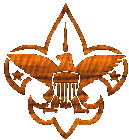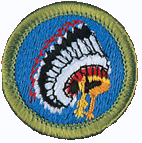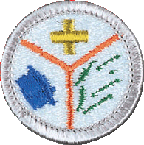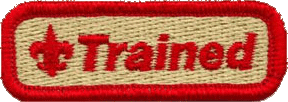
|

|
 |
Cascade Pacific Council Boy Scouts of America |
 |
|---|
| Merit Badge Counselor Syllabus |
|---|
| This syllabus is for use in training individual Merit Badge Counselors. Trainers should have been trained at the District or
Council level and should utilize all portions of this syllabus. |
| Overview Statement: The BSA offers a unique educational opportunity through its Merit Badge Program. Wide varieties of topics are available for individual and group study. The topics and techniques provide a tool for character development while giving the Scouts experience working with BSA registered adults who are new to them. This program also allows the Scout to learn hobby and career skills while providing the BSA registered and trained adult Counselors the opportunity to give back to the community by servicing youth. Cascade Pacific Council suggests that no youth complete more than five Merit Badges from any given Counselor so that he has the opportunity to experience a diversity of Counselors and experiences. |
 |
 |
 |
Who Can Be A Merit Badge Counselor? |
| Anyone who has reached the age of 18 can be a Merit Badge Counselor. There is no monetary cost associated with the application.
Men, women, minorities along with non-Scout members of the community make the Scouting program stronger through diversity and allow
for wider growth and learning experiences for the Scouts. Community organizations (YMCA, athletic clubs, churches, fraternal
organizations, etc.) are also good sources for Counselors. The adult, through vocation or avocation, must know the topic well enough to make it interesting for the young men he/she is counseling. The candidate must:
|
| The person who approaches the potential Merit Badge Counselor should explain the requirements for becoming a Counselor, and the
reasons why registration and training are essential requirements for working with our youth. |
| How to find Merit Badge Counselors |
| A very useful form in the Unit Committee Book is entitled “Parent Survey.” {provide copies of the survey}. The
Chartering Organization usually has several good candidates hiding in their ranks; their leadership will often help you locate them.
The community in general is also a great place to find Counselors. Do not overlook women, retirees, minorities, physically disabled
and the people you think have the least amount of time to give. (This might be the only job in Scouting that is truly less than an
hour a week.) |
| Be Registered |
| The Counselor must completely fill out the current Adult Application to join Boy Scouts of America. {These forms are free -
freely hand them out!} The Cascade Pacific Council has a federal background check done on every person who registers. A completed
Merit Badge Counselor Information Form must also to be completed. Go over the form, emphasize that all the lines must be filled in
and that each question must be answered.} The Counselor is not to work with youth until the background check is completed. If there is a problem with the background check, the person will be notified by certified mail. Either the Troop or the District will be notified depending on the counselor’s primary registration. For example, if the person is only a Merit Badge Counselor, the District Advancement Chair is notified; but if the person holds a position within the Unit, the Unit will be notified. This is why it is so important that the District Advancement Chair provide a new list to the Unit Advancement Chair each time the Unit list changes. Units recruit Counselors who will go on the Unit list. If the Counselor chooses, they can agree to help any Scout in the Council by marking "yes" on the question that asks if the Counselor is willing to help Scouts outside his/her unit. The District Advancement Chairman has the ability to keep the Counselor's information available only to the home unit or make it available to all of the District Units if the Counselor agrees. Not every unit can find enough Counselors for all 119 Merit badges; therefore the District list allows Scouts in smaller Units to work with more "safe" adults. The Cascade Pacific Council has completed a Council Merit Badge Counselor list of those people willing to work with any Scout in the Council. This will give the youth even more opportunities. This list is held by the Council Advancement Chairman and names from that list are distributed on an “as needed” basis. The line of contact should be first the Scouts own Unit followed by the District MBC list. Then, only if a Counselor can not be found using those two lists the Council Advancement Chair should be contacted. The application process is:
|
 |
 |
 |
| Be Trained |
| Counselors must have Adult Youth Protection Training prior to working with any youth. Youth protection training is one of
the BSA’s tools to safeguard both the adult and youth from allegations of abuse. The training, combined with the federal
background check, allows the parent and Scoutmaster to know that the youth is being sent to a “safe” adult. Youth
Protection Training is available on the Cascade Pacific Council Web page
www.cpcbsa.org - click on “training” then on “youth protection”. The on-line class takes approximately
90 minutes. Youth protection is also available at the District level - ask your District Training Chairperson for dates, times and
locations. Merit Badge Counselors must attend Youth Protection Classes offered by the District or Council every two years. Training in the Merit Badge process is to ensure that Merit Badges are experienced with the same quality and uniformity throughout the nation. The training in counseling allows the program to be fair and consistent for every Scout. The scouter training counselors on the Unit level needs to have been trained at a District or Council training. The District trainer needs to have taken Council Training. The Advancement Extravaganza is a Council Training. |
| Buddy System-Youth Protection (Adult Protection) |
| The Boy Scouts of America, in order to protect every one involved, mandates that a Scout must have a buddy with him at each
meeting with a Merit Badge Counselor. This system protects the Scout from potential abuse, provides for a safe learning environment
and protects the adult from accusations. A Scout’s buddy can be another Scout, or be a parent or guardian, brother or sister, relative or friend. The Counselor’s spouse or child is not considered a “buddy” according to the National Boy Scout office. At no time should a Counselor be with a Scout one-on-one. Cancel the appointment and reschedule if you do not have a third person available for the learning experience. Do not meet one-on-one with a Scout under any circumstances - even in a highly public area. |
| How to Protect Unit Merit Badge Counselors |
| It is very import to protect the Units Counselor’s private information. A Committee Member needs to have all of the
pertinent data; however, it is not to be given to everyone in the Unit. Only Merit Badge, Unit, Name, City and Phone number should
be on the list given to the person responsible for delivering the information to the Scouts. Actual home address should not be given
out. The Scout can contact the Counselor either at the meeting or by phone to arrange a meeting place. |
 |
 |
 |
Role of a Merit Badge Counselor |
|
| Methods of Merit Badge Counseling |  |
|
| Process Guidelines |
NATIONAL REQUIRES
|
 |
 |
| CASCADE PACIFIC COUNCIL SUGGESTS |
|
 |
Methods of Merit Badge Counseling |
UNIT DECIDES
Merit Badge Policies: The Unit Committee, Adult Leaders, Senior Patrol Leaders and others that the Unit deems necessary are the ones to decide how youth in the Unit achieve their Merit Badge goals using the National, Cascade Pacific Council and Unit process guidelines. When the decisions have been made, it is important that the Unit communicates the Unit policies regarding Merit Badges to the Adult Leaders, the Committee Members, the Merit Badge Counselors, Scouts, and the Parents. Policies should be put in writing for all to see. Written policies will allow all to have equal and fair treatment while achieving their badges. These policies will help your Merit Badge Counselors to better serve the Youth. Most problems arise when Merit Badge policies are not in writing and individuals are not clear about them. Items to include in this policy would be:
The Merit Badge Application Form: The Merit Badge Application Form (actually a card) is not necessarily blue. {If possible, provide a card to everyone in the classroom and use a blown-up copy to illustrate}. It is the color of tag board that is used by the Council when the Applications need to be re-produced. The card is 2 sided with 3 distinct sections. There is no true “front” or “back” side. When looked at from the side with the printing date, the following information appears from left to right:
Turn the Merit Badge Application Card Over Moving again from left to right:
At this point, the Counselor has his/her section. The Unit can choose to keep both remaining sections in a file. Or, the Applicant’s Record section can be given to the Scout to file with his “Merit Badge Card” and the Unit can keep the Application for Merit Badge section in its file. The decision should be in writing and consistent with an emphasis on the importance of keeping good records and being able to locate them if necessary. There is no requirement that a portion of the Merit Badge Application form go to the District or the Council, nor is any turned in with the Advancement Report Form when the badge is purchased. Sample Steps for Earning Merit Badges
|
 |
 |
 |
Suggestions for Committee and Scoutmaster on the Merit Badge Process |
|
SCOUTS WITH SPECIAL NEEDS: |
| There is a special committee within the Cascade Pacific Council to help Scouts with special needs work their way to Eagle Rank.
The intent of this Committee is to provide assistance and facilitation in the area of Advancement for Scouts with disabilities,
their families, Scoutmasters and Troop Committees. It is currently estimated that there are 43 million individuals in the United
States with disabilities. It is the goal of the Scouts with Special Needs Committee to provide an avenue for all of our sons to
share in the opportunity to experience the principles and pleasures provided through participation in the Boy Scouts of America.
The Cascade Pacific Council Special Needs Committee is chaired by Dr. Ken Ettinger, telephone number 503-526-0718. |
 |
 |
Modification of Rank Requirements for Scouts with Special Needs |
There are two basic principles to consider:
|
Extensions Beyond Age 18 for Scouts with Special Needs: |
National regulations have provided the opportunity for Scouts with Special Needs to continue in the pursuit of Advancement
beyond the age of 18 years. Notification and proper medical documentation must be submitted to the Special Needs Committee for
evaluation and approval.How to proceed: |
 |
The Council provides training and resources for Adult Leaders and Merit Badge Counselors:
|
RESOURCES: |
| BSA Program Helps BSA Handbook BSA Adult Application BSA Application for Merit Badge Card BSA Scoutmaster Handbook CPC Advancement Committee 2011 Boy Scout Requirement Book BSA Youth Protection Guidelines District Advancement Committees CPC Extravaganza Notebook 2011 Merit Badge Counselor Reference Manual Merit Badge Counselor Information Sheet Advancement Policies and Procedures Manuals (National {33088C 1999} and CPC {revised 12/2000}) www.cpcbsa.org |

